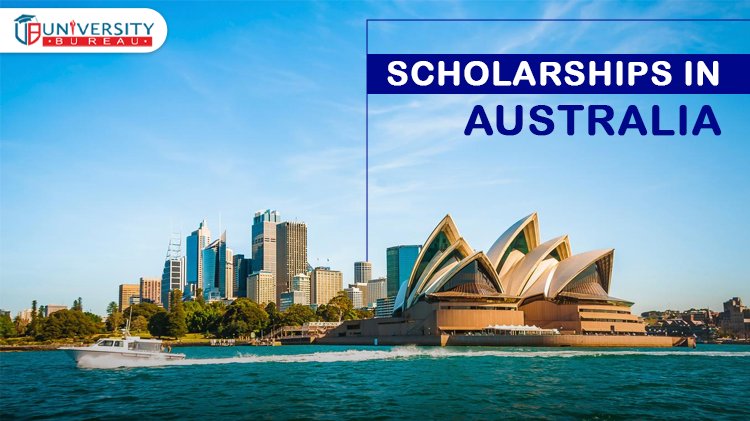Scholarships in Australia
Discover a wide range of scholarships in Australia to support your academic journey. Find opportunities for international students and local scholars.

Australia, one of the most popular study abroad countries, has a wealth of options for overseas students, including several funding opportunities. Scholarships in Australia give worthy students financial support, increasing the accessibility and affordability of higher education. This blog will cover the wide selection of scholarships offered in Australia, as well as the application process, eligibility requirements, and advice for getting financing for your academic endeavors.
1. Types of Scholarships in Australia:
a. University Scholarships: International students can apply for scholarships from many Australian universities, which are awarded on the basis of extracurricular activities, leadership potential, and academic merit. These scholarships may pay for living expenses, other study-related costs, and tuition in full or in part.
b. Government Scholarships: The Australian government offers scholarships to foreign professionals, researchers, and students in a range of subjects and educational levels, in collaboration with other departments and agencies of the government. The objectives of these scholarships are to improve research quality, encourage international collaboration, and fortify Australia's educational connections with other nations.
c. Private Scholarships: In Australia, there are a lot of corporate sponsors, foundations, and private groups that provide scholarships to students who want to go to college. These scholarships may be awarded to students from particular nations or areas, underrepresented groups, or particular fields of study.
d. Research Scholarships: Australia provides a variety of scholarships that are especially intended to encourage research endeavors for students interested in pursuing research degrees (such as a PhD or Master's by Research). These awards frequently cover living expenses, travel grants, research costs, and tuition fees.
e. Merit-Based Scholarships: Students are given merit-based scholarships according to their overall academic performance, standardized exam results, and academic accomplishments. These scholarships honor achievement and provide rewards to students who show extraordinary talent and commitment to their studies.
2. Eligibility Criteria:
Know about the requirements for each scholarship provider's eligibility before submitting an application for a scholarship in Australia. Although the specific scholarship may have different qualifying standards, some typical ones are as follows:
a. Academic Merit: A strong academic record, usually attested to by excellent grades or test results, is a prerequisite for many scholarships.
b. English Proficiency: Test results from accredited English language assessments, like the TOEFL or IELTS, may be needed as evidence of an international student's English language ability.
c. Field of Study: While some scholarships are restricted to particular disciplines or fields of study, others might be available to students enrolled in any course or program the university offers.
d. Country of Citizenship: While certain scholarships may only be available to students from specific nations or areas, others may accept applications from candidates anywhere.
e. Financial Need: Students who show a need for financial assistance or hardship are given preference for some need-based scholarships
f. Leadership and Extracurricular Activities: Scholarship applications may take into account an applicant's capacity for leadership as well as their volunteerism, community service, and extracurricular accomplishments.
3. Application Process:
The following steps are usually involved in the Australian scholarship application process:
a. Research: Start by researching scholarship opportunities available at Australian universities, government agencies, private organizations, and research institutions. Identify scholarships that align with your academic and career goals.
b. Check Eligibility: To find out if you qualify for each scholarship, go over the conditions for eligibility and application. Be mindful of the due dates, required paperwork, and particular guidelines that the scholarship provider has supplied
c. Prepare Documents: As requested by the scholarship application, collect all the required documents, such as academic transcripts, recommendation letters, personal statements, CVs or resumes, and evidence of English language skills.
d. Submit Application: Fill out the scholarship application completely and send it in before the deadline. Make sure that your application is error-free and includes all necessary documentation.
e. Await Notification: Following the submission of your application, wait for review from the scholarship selection committee regarding its review and assessment. The scholarship recipient will be contacted by email or regular mail after their application has been approved
f. Acceptance and Enrollment: If you are given a scholarship, be sure you read through all of the qualifications and terms of the offer, including any obligations. After accepting the scholarship offer, enrol at the appropriate school.
4. Tips for Securing Scholarships:
a. Start Early: To ensure that your application materials are ready by the deadline, start your research on scholarship opportunities well in advance.
b. Tailor Your Applications: Give special attention to the aspects of your resume, professional goals, and character that make you stand out as a worthy recipient of the scholarship.
c. Seek Guidance: You can get insightful commentary and advice on your scholarship applications from mentors, academic advisers, or scholarship advisors.
d. Showcase Leadership and Involvement: To highlight your well-roundedness and dedication to having a good influence, highlight your leadership abilities, volunteer work, extracurricular activities, and community involvement in your scholarship applications.
e. Highlight Unique Qualities: Highlight any special abilities, experiences, or successes that help you stand out from the competition and qualify you for the scholarship.
f. Write Compelling Essays: Write strong essays or personal statements that highlight your enthusiasm for your subject of study, your professional aspirations, and how winning the scholarship would advance your education and career.
g. Obtain Strong Recommendations: Get reference letters from mentors, employers, instructors, and other professionals who can vouch for your character, academic prowess, and success potential
h. Be Persistent and Resilient: Recognize that there is a chance of rejection and that the scholarship application process might be competitive. Still, be tenacious and strong, and keep looking into additional scholarship alternatives.
5. Benefits of Scholarships in Australia:
a. Financial Support: Scholarships lessen the financial strain on students and their families by helping to pay for living expenses, tuition, housing bills, and other educational expenses.
b. Recognition and Prestige: Being awarded a scholarship raises your profile in the academic world by attesting to your leadership abilities, personal attributes, and academic accomplishments.
c. Access to Resources: Recipients of scholarships have access to priceless tools, facilities, and research opportunities provided by colleges and other organizations, which improves their academic performance and enriches their academic experience.
d. Networking Opportunities: Scholarships frequently offer chances to network with other students, instructors, business executives, and alumni, creating relationships and teamwork that can help your academic and career aspirations.
e. Personal and Professional Growth: Scholarships provide chances for professional and personal development through leadership training, internships, mentoring, and other enrichment activities that promote your overall development.
In Australia, scholarships are essential to the accessibility, affordability, and inclusivity of higher education for students from many backgrounds and locations. Scholarships provide students access to resources, recognition, and financial support—all of which enable them to pursue their academic ambitions and make significant contributions to society.
When you start your quest to study abroad in Australia, don't forget to apply for as many scholarships as possible and put in the time and effort to craft compelling scholarship applications. Don't forget to personalize your applications, emphasize your special talents, and show off your enthusiasm for leadership and education. You can achieve academic and professional success in countless ways if you are persistent, determined, and have the backing of scholarships.
What's Your Reaction?




















